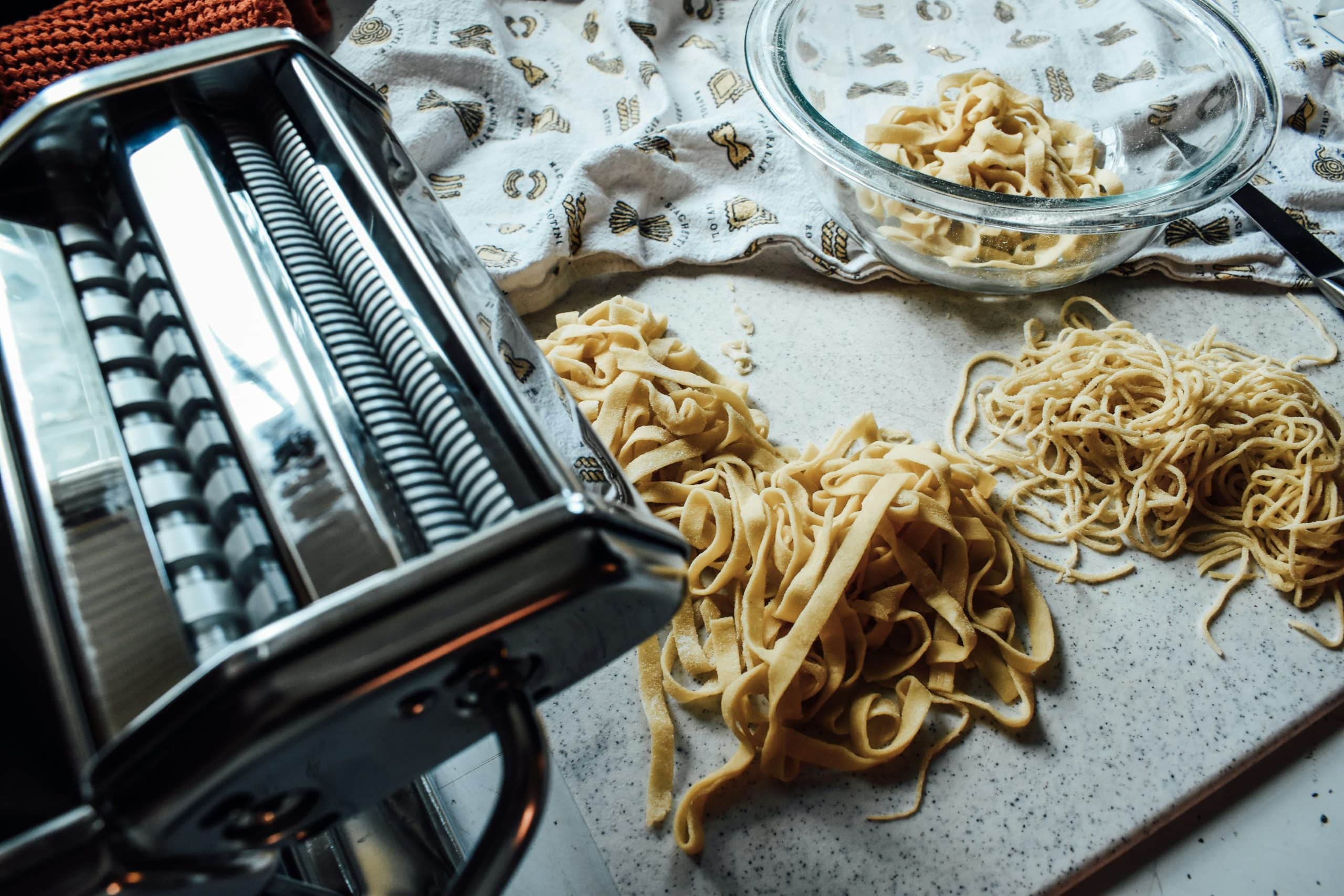Homemade pasta workshop: from dough to delicious

Creating your own pasta from scratch is an art that has been cherished and perfected over centuries. As you knead the dough and shape your pasta, you will immerse yourself in a world of tradition, taste, and creativity that is guaranteed to provide an unforgettable experience. Whether you’re an experienced home cook or a culinary newbie, a homemade pasta workshop can elevate your cooking prowess to new heights.
Inviting guests to the pasta-making class
Hosting a pasta-making class is a wonderful way to bring people together and share a unique and enjoyable experience. Whether it’s an intimate gathering of close friends or a larger group of acquaintances, your fresh pasta class will provide an entertaining and educational event.
Sujet a lire : The beauty of bento boxes: japanese lunch art
You will begin by introducing your guests to the history and traditions of pasta making. This is a chance to share your passion and knowledge, and to set the scene for the hands-on experience to come. A good pasta class is about more than just cooking; it’s about storytelling.
Next, demonstrate the basic techniques of pasta making. From mixing the dough to rolling it out and cutting it into various shapes, your guests will get a firsthand look at the process. Encourage them to get their hands dirty and join in the fun. The more they participate, the more they will learn.
Avez-vous vu cela : Kid-friendly cooking: fun and nutritious meals
Understanding the ingredients: From eggs to flour
A perfect pasta dough begins with the right ingredients. Fresh eggs and high-quality flour are the cornerstones of any pasta recipe, and understanding how they interact is crucial to achieving the ideal texture and flavor.
During the class, explain the significance of each ingredient. Discuss the role of the egg in providing moisture and richness, and the importance of selecting the right flour. Each element has a purpose, and understanding these can elevate your pasta from merely good to truly exceptional.
You might also wish to discuss optional additives like oil or water, and when to use each. Providing this level of insight will not only make the class informative but will also empower your guests to experiment with their own pasta recipes at home.
Hands-on experience: Making pasta from scratch
Once the guests have a solid understanding of the ingredients, it’s time to dive into the hands-on pasta making. Divide the class into smaller groups, allowing each to work on their own batch of dough. Provide assistance and guidance as needed, ensuring that everyone is participating and learning.
Next, demonstrate the process of kneading and resting the dough, explaining the significance of each step. Then, introduce your guests to different methods of shaping pasta, from simple spaghetti to more complex shapes like fusilli and farfalle.
This hands-on section of the workshop should be fun and interactive, allowing guests to learn by doing. It’s a chance to create something tangible and delicious, all while learning new skills and techniques.
Crafting the perfect sauce
A great pasta dish is as much about the sauce as it is about the pasta. In this segment of the workshop, you should introduce your guests to various types of sauces, from simple tomato-based sauces to more complex cream or wine reductions.
Show the class how to create a basic tomato sauce from scratch, discussing the importance of using fresh, high-quality ingredients. Then, demonstrate how to build flavors by adding herbs, spices, and other aromatics. If you’re feeling adventurous, you could even show your guests how to flambé – a technique that involves igniting a small amount of alcohol in the pan to enhance the flavor of the sauce.
You might also wish to introduce your guests to the art of pairing pasta shapes with sauces. Certain shapes are better suited to certain sauces, and understanding these pairings can significantly enhance the final dish.
Wine pairings: The perfect complement to your pasta
No Italian meal is complete without the perfect bottle of wine. In this part of your class, teach your guests about the basics of wine pairing, focusing on the wines that complement pasta dishes well.
Discuss the principles of balancing flavors, pairing light wines with delicate sauces, and more robust wines with heavier sauces. Explain the differences between various grape varietals and wine regions, and how these factors can influence the taste of the wine.
Consider providing a tasting of several different wines, allowing your guests to experience firsthand how the flavors of the wine can enhance the flavors of the pasta. This will provide a well-rounded culinary experience, adding an extra layer of sophistication to your pasta-making workshop.
By the end of your homemade pasta workshop, your guests will not only have learned a valuable new culinary skill, but they will also have enjoyed an unforgettable experience. They will bring home not just a batch of homemade pasta, but also a wealth of knowledge that will inspire them to continue exploring the art of Italian cuisine. And who knows? You might just inspire the next great pasta chef.
The Pleasure of Tasting: Enjoying the Fruits of Your Labor
After the hard work of creating your fresh pasta is finished, the ultimate reward is in the eating. A vital part of any pasta-making workshop is the tasting session. It’s time to cook up the homemade pasta, toss it gently with the sauce that has been simmered to perfection, and serve to your guests.
In the culinary world, tasting the dishes you’ve prepared yourself is a great source of satisfaction and pleasure. As the host of the pasta-making class, your role is not only to instruct but also to instill an appreciation for the final product. Take a moment to discuss the flavor profiles of the pasta, the texture achieved, and the balance between pasta and sauce.
Instruct your guests on how to evaluate the dish. Consider factors like the pasta’s "al dente" status – a term used to describe pasta that is cooked to be firm to the bite. Discuss the richness of the egg pasta, the robustness of the tomato sauce, and how these elements work together to create a harmonious dish.
If wine has been paired with the pasta, discuss the interplay between the flavors of the food and the wine. This tasting session can transform the homemade pasta workshop into a holistic gastronomic experience.
Conclusion: A Culinary Journey Worth Undertaking
In conclusion, a homemade pasta workshop is more than just a cooking class. It’s a journey into the heart of Italian cuisine, a hands-on exploration of one of the world’s most loved foods. From understanding the highest quality ingredients to kneading the dough from scratch, shaping pasta into different forms, creating a delightful sauce, and finally, savoring the fruits of one’s labor – it’s a magical process.
The skills learned during this workshop will serve participants well beyond the class. They will be equipped to recreate the pleasure of fresh pasta anytime at home, and perhaps even host their own pasta making class. Indeed, the joy of cooking and eating homemade pasta can become a cherished ritual, a way to bring family and friends together over good food and laughter.
So whether you’re in the heart of Italy, in a bustling city like Los Angeles, or in the comfort of your own home, the art of pasta making is within your reach. It’s a culinary adventure that promises rich rewards – delicious food, newfound skills, and an unforgettable experience. As the saying goes, "Give a man a bowl of pasta, and you feed him for a day. Teach a man to make pasta, and you feed him for a lifetime."
In the end, it’s not just about the pasta. It’s about the love, passion, and creativity that goes into it. From the very first roll and cut of the dough to the very last bite, homemade pasta is a labor of love – a testament to the beauty of simple ingredients transformed with care and skill into a truly exceptional meal. Do embark on this wonderful journey of pasta making. Buon Appetito!
